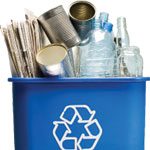
Plastic bottles lugged out to the curb in Cumberland County may one day be reborn as trash bags. Mercer County’s newspapers go to Homasote Company in West Trenton, where they are made into wall panels sold at building-supply stores. Anheuser-Busch in Newark recycles its leftover grain to feed livestock, and a smelter in Perth Amboy transforms recycled cars into re-bar. Even glass, a money-loser for most recycling programs (hence the increase in plastic containers for foods such as pickles and ketchup) is reused in asphalt in South Jersey.
The Garden State may be known for landfills, but its counties and communities are well versed in the ways of recycling. New Jersey still lags behind its goal of recycling 60 percent of the state’s waste stream, but more than 57 percent of the garbage generated by residents and companies—in excess of 12 tons—was recycled in 2007.
Every community is expected to recycle three types of waste—aluminum, glass, and newsprint—but many also include corrugated cardboard, different types of plastic, and mixed paper. Many towns are feeding recyclables to intermediate processing facilities, which accept commingled items and feature conveyor belts with technology that can separate out each waste stream. And many towns are stepping up efforts to make recycling easier—and less expensive. In Chatham Borough, a pay-as-you-throw program charges residents for each garbage bag hauled to the dump, but makes recycling free. Bound Brook will reject trash bags that have recyclables in them. If we keep up such efforts, we’ll hit that 60 percent mark in no time.
Plastic Primer:
There are seven different types of plastic out there, designated by the number you’ll find etched on the container. Each has its own set of characteristics—and recycling capability.
 | |||
 | |||
 | |||
 | |||
 | |||
 | |||
 |
